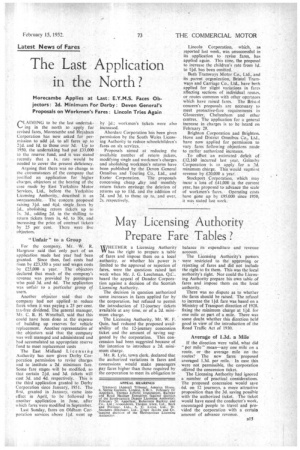May Licensing Authority Prepare Fare Tables,?
Page 49

If you've noticed an error in this article please click here to report it so we can fix it.
WHETHER a Licensing Authority W has the right to prepare a table of fares and impose them on a local authority, or whether his power is limited to the approval or rejection of fates, were the questions raised last week when Mr. J. G. Leechman, Q.C., heard the appeal of Dundee Corporation against a decision of the Scottish Licensing Authority.
The decision in question authorized some increases in fares applied for by the corporation, but refused to petmiL the introduction of I2-journey tickets available at any time, or of a 2d. minimum charge.
The Licensing Authority, Mr. W. F. Quin, had reduced the proposed availability of the I2-journey concession ticket and the amount of saving suggested by the corporation. This concesssion had been suggested because of the intention to introduce a 2d. minimum charge.
Mr. R. Lyle, town clerk, declared that 'the authorized variations in fares and concessions would make passengers pay fares higher than those required by the corporation to meet its obligation to balance its expenditure and revenue account.
The Licensing Authority's powers were restricted to the approving or rejecting of fares and did not include the right to fix them. This was the local authority's right. Nor could the Licensing Authority prepare his own table of fares and impose them on the local authority.
There was no dispute as to whether the fares should be raised, The refusal to increase the lid. fare was based on a Ministry of Transport direction of 1928. fixing the minimum chargeat 11d. for one mile or part of a mile. There was some doubt whether this direction held good in view of the introduction of the Road Traffic Act of 1930.
Average of 1.3d. a Mile
If the direction were valid, what did "per mile" mean—any one mile on a route, or the average mile on the routes? The new fares proposed averaged 1.3d. per mile. In case this were not permissible, the corporation offered the concession ticket.
The Licensing Authority had ignored a number of practical considerations. The proposed concession would save 6d. on 12 journeys, a more attractive proposition than the 3d. saving possible with the authorized ticket. The ticket would have eased the conductor's work, encouraged people to travel and provided the corporation with a certain amount of advance revenue.




















































































